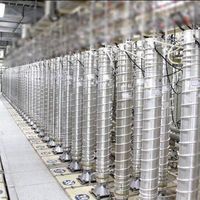Iran declares others will rise to succeed killed Hamas leader
The Iranian Foreign Ministry has issued its first response to the assassination of Hamas leader Yahya Sinwar, saying that it will not weaken the fight against Israel and that others will rise to take the place of the slain militant leader.
"Undoubtedly, the physical elimination of fighters on the path of dignity and human honor will not undermine the school and path of resistance," the Foreign Ministry's statement read.
Its statement, published midday Friday, largely echoed that of the state's Strategic Council on Foreign Relations (SCFR) -- the body, composed of senior diplomats, playing a key role in shaping the state's approach on regional and international issues.
The SCFR, reporting directly to the Supreme Leader, asserted that the killing of the Hamas leader would neither weaken the "Axis of Resistance" nor deter the "Palestinian struggle against Israeli occupation."
"Just as these leaders rose from among the oppressed people of Palestine and Lebanon, others will rise to take their place," the statement by the SCFR read.
Prior to those acknowledgments, state-controlled media outlets like Tasnim, affiliated with the IRGC, had delayed over 18 hours before cautiously acknowledging Sinwar's killing.
Other domestic Iranian media echoed initial reports with minimal updates, providing narratives to protect Sinwar's image as a "hero" within the establishment.
Israel said on Thursday that it had killed Sinwar, the mastermind behind the October 7 attacks that triggered the war, marking one of the most significant strikes against Hamas' leadership in the ongoing Gaza conflict.
Iranian President Masoud Pezeshkian also responded to the assassination, saying, "The enemy should be aware that the martyrdom of commanders, heroes, and leaders will not create any disruption in the resistance of the Islamic Ummah (nation) against oppression and occupation."
Sinwar, a key figure in Hamas since its early days, had been the primary architect of the deadly assault, which claimed the lives of over 1,100 Israelis, mostly civilians – the largest killing of Jews since the Holocaust.
The SCFR emphasized its message, saying that the "Axis of Resistance"—an Iran-led alliance of groups opposing Israel and Western influence, including Hamas and Hezbollah—would not be weakened or deterred by the assassination of its leaders
In line with this approach, former Islamic Revolutionary Guard Corps (IRGC) chief commander Mohsen Rezaei responded to the killing early Friday.
He took to X to attack the Israeli operation, stating, “Warriors of the resistance front, like the martyr Yahya Sinwar, are fighting the invading soldiers on the battlefield. We are prepared for battle, and victory is ours."
Journalist and political analyst Ahmad Zeidabadi in Tehran took to his Telegram channel to say that it was not the right time for a comprehensive evaluation of Sinwar’s legacy.
In the cautiously drafted post, Zeidabadi hinted that the ultimate assessment of Sinwar’s legacy should be left to the Palestinian people in the future.
In its first public response to the killing of its leader, a senior Hamas official told NBC News on Friday that the militant group would emerge even stronger.
Sinwar's assassination follows a recent string of high-profile assassinations targeting leaders within the "Axis of Resistance" in the past few months.
Lebanon's Hezbollah militant group, part of the “Axis”, said on Friday it was moving to a new and escalating phase in its war against Israel.
Israeli Prime Minister Benjamin Netanyahu said in a video message Thursday, that Sinwar’s death marked “the beginning of the day after Hamas,” but “the task before us is not yet complete.”







